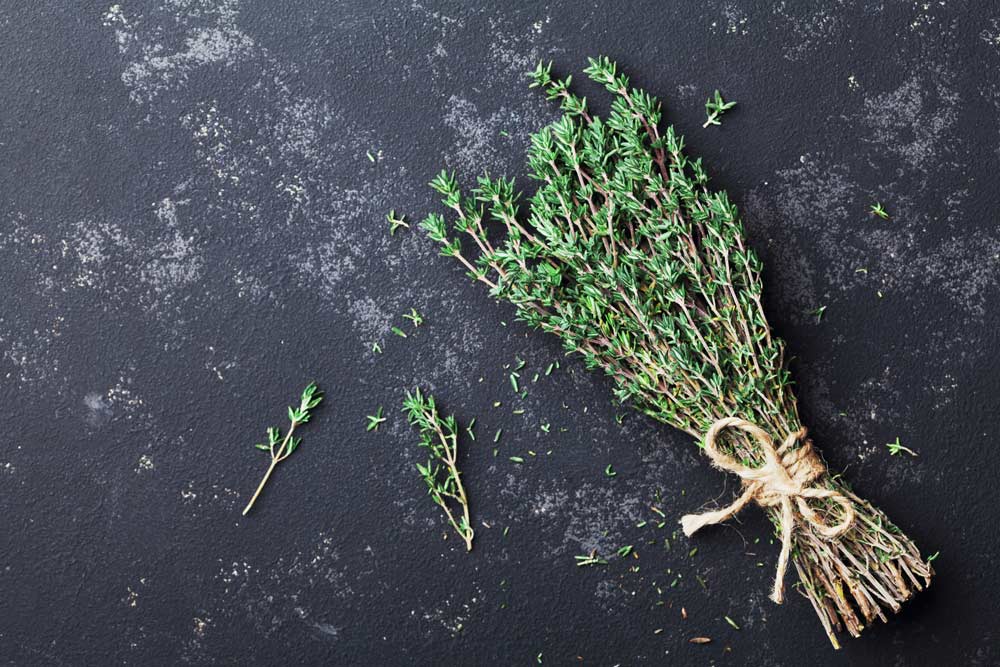Thyme Essential Oil

Thyme oil is one of the strongest antioxidants known, and it has been used as a medicinal herb since ancient times. Thyme essential oil has a rich medicinal history that spans multiple cultures and many uses from an antidote for poison and venom to protection against the plague and more.
Thyme oil is antiseptic, antibacterial, antispasmodic, hypertensive and has calming properties. Thyme supports the immune, respiratory, digestive, nervous and other body systems.
Health Benefits of Thyme Essential Oil
Eliminate spasms, Remove toxins, protect wounds, kill bacteria, chest infections, coughs, and colds, promote heart health, relief from excess gas, heal scars, increase urination and regulate menstrual cycles.
Asthma
With its immune-boosting properties, as well as its expectorant and antibacterial abilities, thyme oil is ideal for asthma sufferers, as it can clear out the excess mucus in the respiratory tracts. Thyme has potent antiseptic properties that can be cleansing to the lungs for healthier respiratory function. Thyme oil can strengthen the respiratory system and fight colds, coughs, and wheezing spells.
Antioxidant
Antioxidants slow the aging process and lead to healthy, glowing skin. Thyme oil is one of the strongest antioxidants known.
Anti-inflammatory
Thymol’s anti-inflammatory effects have been documented in several studies. The thymol in thyme oil is effective at reducing inflammation. Thyme oil has excellent antiseptic qualities that relieve both swelling and inflammation.
Skin Health
The mixture of antiseptic properties and antioxidant stimulants in Thyme oil can keep your skin looking clear, healthy, and young as you age! [1]
Cold and Flu
Thyme oil is the most powerful oil for fighting a cold or the flu. Thyme oil drains congestion and cures infections in the chest and throat that cause the common cold or cough. The thymol content in thyme oil is believed to have antispasmodic properties. When mixed with primrose, thyme essential oil is effective at reducing coughs and the duration of respiratory tract infections like the common cold. [2]
Heart Health
One study found that the Carvacrol, a component of thyme oil, was an effective anti-inflammatory agent with cardioprotective capabilities. [3]
Antiseptic
Thyme essential oil contains 20 percent to 54 percent thymol, which gives thyme oil its antiseptic properties. Due to components like caryophyllene and camphene, Thyme oil is know to fight infections on the skin and within the body.
Antibacterial
Thymol, the most prevalent terpene in thyme oil, has antimicrobial properties and can be effective in treating bacterial infections and inhibiting bacterial growth. One study found that the oil from the thyme plant exhibited extremely strong activity against all 120 clinical strains and demonstrated a good efficacy against antibiotic-resistant strains. [4]
Parasite Cleanse
Use thyme oil in your parasite cleanse to treat roundworms, tapeworms, hookworms and maggots that grow in open sores.
Increase Circulation
Thyme essential oil is a stimulant that activates circulation in the body, which keeps blood flowing property to extremities and areas that need oxygenation. [5]
Promote Oral Health
Thyme oil works as a gum disease natural remedy. With its antiseptic and antibacterial properties, thyme oil is a natural way to kill germs that cause bad breath. Thymol, an active component in thyme oil, is used as a dental varnish that protects the teeth from decay.
Hair Growth
Thyme oil is known to stimulate hair growth, and it washes away germs and bacteria that may build up on the scalp.
Promote Digestion
Thyme oil stimulates the elimination of toxins from the body through urination. This helps to reduce weight, lower blood pressure, reduce fats, and improve digestion as well.
Detox
Linalool, one of the most common components in thyme oil, can stimulate healing and regeneration in the liver and may help to detoxify the liver. [6]
Insect Repellent
One study found that thyme oil, applied to the skin, repelled mosquitos for 1-3 hours in a lab setting. [7] Thyme essential oil is also used to treat insect bites and stings.
History of Thyme Oil
Hippocrates, who lived around 460 BCE to 370 BCE and is known today as "the father of Western medicine," recommended thyme for respiratory diseases and conditions.
The ancient Egyptians used thyme as an embalming fluid. In ancient Greece, they used thyme as an incense in temples and added it to bathwater.
Mythology
When the Black Death took hold of Europe in the 1340s, people would wear posies of thyme for protection.
The Ancient Egyptians used thyme as an aid to mummification. The herb was also laid on coffins during funerals because it was believed that it provided a safe passage to the next life.
The Greeks used Thyme in religious cleansing ceremonies, and the Sumerians used it as an antiseptic.
Method of Extraction
The essential oil of thyme is extracted from the partially-dried leaves and flowering tops by water or steam distillation.
Thyme Chemical Composition
Thyme oil composition consists of Thymol, a-Terpinene, p-Cymene, b-Myrcene, a-Pinene, a-Thujene, Linalool, Borneol, and Carvacrol. Thyme's essential oil, usually referred to as "oil of thyme," contains between 20 percent and 60 percent thymol.
Properties of Thyme Oil
Thyme essential oil is an antispasmodic, antirheumatic, antiseptic, bactericidal, bechic, cardiac, carminative, cicatrizant, diuretic, emenagogue, expectorant, hypertensive, insecticide, stimulant, tonic, and vermifugal substance.
Uses for Thyme Essential Oil
Thyme essential oil can be used topically, aromatically, and even internally.
Precautions
Essential oils should always be diluted in a carrier oil like coconut oil before topical application. Improper dilution can result in skin irritation. Essential oils should not be used during the first trimester of pregnancy and your healthcare provider should be consulted before using oils later in pregnancy.
Thyme oil is an irritant to some people and may cause allergic reactions in some cases. It is also a hypertensive substance that increases blood pressure, so those with high blood pressure should use it after consulting a doctor. It is an emmenagogue, therefore, it should be avoided during pregnancy.
